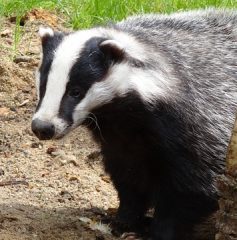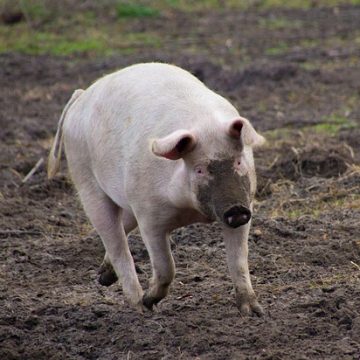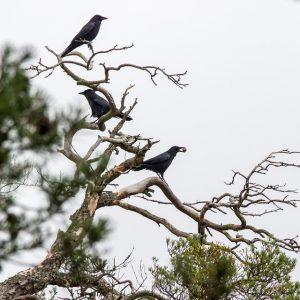


Mark Rutterford writes and performs his short stories in towns and cities across the South West – stories with a love interest, a bit of humour and, quite often, told with a prop in hand.
Although a proud member of Stokes Croft Writers in inner-city Bristol, Mark is most at home in the countryside. He has a thing about badgers.

A Declaration
Mark Rutterford
‘Why have you got a badger with you, John?’
That question really annoyed me and I let it show.
‘You ask me that?’ I said. ‘Such an inconsequential, superficial detail. Have you no pride? Have you no shame? No sense of worth?’ I threw my arms out wide and shook my head.
‘Of course not. We know…not. That’s why we’re here,’ I fumed.
I ranted a bit next, a little bit too much I thought after the event. But I’d suffered fools like the journalist for long enough and there had been too much suffering all round. Too much, for far too long. It was time now, to make a stand.
‘You could have asked me why the sky is black with birds, why the ten thousand cattle or five thousand pigs. No matter that foxes and sheep walk side by side. No question why otters ride on horses’ backs. Or the stoat on the deer. No question to ponder why the clock-face of Big Ben cannot be seen for bees? Why every drain within a mile squeaks with rats? No question why? Why this union of species have chosen to descend on London, on Parliament Square? I know you’ll get obsessed by the question “how?” I can understand that, I’ve asked myself. But I can’t understand that a journalist. given the opportunity of today, the 4th of July 2049, does not ask the simple, fundamental question “WHY?”’
There was quiet, for a few seconds. The click of cameras, the hum of lights – that was all. I crouched to stroke the badger’s head as she slumped over my boots and leaned into my shins.
‘She feels safe, in contact with family. They scent each other, Badgers, sharing musk so they recognise their siblings and parents and cousins. And they huddle and crowd each other in meticulously clean and straw-lined homes we call setts. I’ve known her since she was twelve weeks old and the three generations before her and now, I am very proud and much more ashamed to say, that I am almost all the family she has left. She feels safe in contact with me. Even here, in daylight, in London. That’s all.’
I stood again before continuing.
A Declaration – Mark Rutterford 2
‘And all the rest of your visitors today, the farmed ones and the wild…they stopped feeling safe generations ago. They’re not protected and not respected and THAT is why!’
I had no idea where this would end. I had some thoughts about what I’d like to change, but no means of making it happen. No power. And to be honest, the past couple of weeks had been so extraordinary, I was still reflecting on how I got here, rather than what happens next.
‘I don’t know how this happened,’ I told the crowd. ‘Don’t get me wrong, I would love to talk to the animals and hear what they have to say, but I’m no Dr Doolittle. When I chat to a wren, they might chit-chat back, but we don’t converse.’
‘So how did you organise this, John?’ somebody shouted.
‘I didn’t. I just began a personal protest march and it seems word got out and others decided to join in.’
‘Protesting against what?’ a shout again.
‘The farm across the valley was building new livestock sheds. Artificially lit, controlled environments, relatively clean and destined that the cows, pigs, sheep and chickens never walk a field of grass in their lives. Never see daylight. We know the economics, we’ve heard the business case, but even for your modern, genetically enhanced cow, you’re making it live in prison for a short and fundamentally unnatural life. And the build was going to take out the copse too, roosts for a thousand birds, home to three families of fox and badger setts that date back to prehistoric times. Even the brook was going to be blocked off upstream, for fear the rising waters of Winter might interrupt the flow of profits.’
My voice rose and fell with incandescence and disgust – the alchemy of my mood.
A Declaration – Mark Rutterford 3
‘I walked through the copse to read the planning notices for myself and I was dismayed. All the shambolic, messy beauty that was about to be lost. The canopy of leaves, the lichen, the insects and mammals, the birds and the trees they sat in, all gone. I saw the Summer sun pierce the darkness and tears filled my eyes at the losses to come and the uncomprehending destruction of habitat and homes to follow.’
‘There was a din in the trees where the copse met the barbed wire fencing of the field. Jackdaws and crows shouted and songbirds made alarm calls. The cows had huddled under the canopy and brayed like donkeys in a cacophony of unrest. A tawny owl screeched, joined by a fox’s scream…at 3 o’clock in the afternoon!’
I had the full attention of the crowd, media included. It reminded me of the moment I was about to describe. So different, so connected.
‘I walked towards the noise and saw that one of the pigs had got past the electric fence and was running cross-country towards us. Her pantomime ears flapped above her and her trotters were bounding nineteen-to-the dozen and I laughed at her beauty and her freedom and shouted “go on girl”. I had to duck through the brambles and unpick my trouser-leg from an inch-wide thorn as I reached the fence and when I looked up, there were hundreds of eyes looking me up and down in complete silence.’
‘It seemed to me, a cry for help. Seemed that the last free cows in Somerset would not give up their freedom so easily. Don’t ask me how I knew, I just did. It was then, in that moment, that I decided to walk to London.’
I paused for a moment and held my hand out to stem further questions. I needed to address the press and the gathering crowds. I needed to explain and most of all, I needed to make people understand.
A Declaration – Mark Rutterford 4
‘I find myself in the role of translator, no more than that. I don’t know how or why I have been given this opportunity, but given as it is, I am determined to do it justice.’
‘I set off from Somerset, on behalf of the last grazing herd in the county and the hundreds of species affected by just one more farm development. I set out alone, but was joined by my friend here on the first night and over the course of the last two weeks, as I crossed county boundaries and got closer to London, I seemed to get more reminders of what I was trying to protect each day. Dragonflies or wasps, farm animals or wildlife – they all seemed to make an appearance. They are all represented here today.’
As if on cue, an insect bit into the skin on a journalist’s neck. She yelped a little, transmitting her discomfort to the hundred people nearest to her in the crowd.
‘As a younger man, I remember being shocked at the brutality of the human race towards this planet and its inhabitants. Killing for sport and concreting for fun and I know, I know, I was complicit in my silence. I remember the stories breaking from the States, of manicured peach-fields where the sanctity of chemical control meant that immigrant workers with paintbrushes had to pollinate the flowers. Industrial farming to feed a world population without limits was always going to be recipe for disaster. And whilst the energy wars of the 2020s gave way to food riots in the last decade, meeting the needs of the people became an ever more short-term pursuit of political power.’
‘The abuses got worse.
In 2030 – green-belts were abolished. ‘The Management of Wildlife Act 2037’, effectively declared a free for all on anything that was deemed to hinder human needs.’
A Declaration – Mark Rutterford 5
In 2041 – the kestrel was declared extinct. Two years later and the house sparrow went the same way.
By 2044, after the loss of thirty thousand hectares of East Anglia and Lincolnshire, a trip to the seaside got closer to home…but the crabs are unfit for human consumption and the cod has long since gone.’
Cameras recorded my every word. The facts were all known, but rarely linked in this way. It had become a lot more perilous to speak up for wildlife in recent years. I took the opportunity as fully as I could, but I was also conscious that profanity would keep me from the news bulletins. Sounding more measured than I felt, I continued.
‘2045 turned out to be a seminal year. Nitrogen poisoning of the soil was diagnosed in a third of the UK’s arable farm-land, food price inflation became the primary economic indicator and when seven women in Crawley were stabbed to death during their year-long vigil outside Europe’s biggest battery hen farm…it made page seven of The Times.’
‘In the last fifty years, we have said goodbye to almost half of our native mammals. Bees and wasps are at critically low levels and yet the flies, the damned flies, grow stronger and more plentiful each year. And it is 20 years since you last saw one of these in the wild.’
I lifted a hedgehog from my pocket and a hundred-thousand camera clicks tore into the air. It’s beauty almost made me cry.
‘Millions of years of evolution had made cows sheer miracles made of grass! And yet today, in England, institutionalised and diminished, most are scared to venture out into the rain. So, when I vowed to walk to London, it was for a small copse in Somerset and for the last free farms in England. I courted publicity and attracted unsolicited donations and unwanted violence – the best and worst characteristics of humanity ringing true until the end.’
A Declaration – Mark Rutterford 6
‘By the time I’d got to Wiltshire, I couldn’t help but notice the increasing number of inquisitive eyes swooping from the sky or looking through the hedges at me. I heard the news reports of cows breaking free from their farms and the pigs that trampled their owner to death. I saw the pictures of Arundel castle, crumbling after its foundations had been undermined by a variety of burrowing animals. The closure of Heathrow, brought to a standstill by starlings and seagulls, the stampedes caused by huge swarms of stinging insects in shopping malls and tube stations. I heard about the rats…’
People looked to the floor, unconsciously and with fear. As well they might.
‘I heard the screams of those who set out to kill me these last three nights. I heard some of the shots they fired too, before being overwhelmed by the native species. I saw their carcasses, and I mean to shock with that term. They were stripped of every ounce of meat and sinew below the neck, and their faces were frozen in terror as the first of many feral teeth nipped at their flesh.’
‘The animals are wild. The insects do sting. And mother nature is mightily annoyed with the human race right now. So, this morning, I woke to find I wasn’t walking alone, but leading a march. This march. I knew nothing about it, but my little protest seems to have been hijacked. So here is the message I bring, from all the non-human living creatures in this country and maybe on this Earth.’
I threw my arms wide and drew breath for my finale.
‘Life and death…they get it. They spend a good deal of the time eating each other after all! But they know that the safety in numbers is for the survival of the species and they know that too many of their number are on the brink of ceasing to be.’
‘And the wild, animal, survival instinct has led them to figure out the cause and it’s us. You and me. Humanity!’